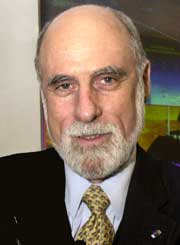Press Releases
Online household appliances and an Interplanetary Internet - the future of the Web explained – University of Reading
Release Date : 01 March 2004
 Esteemed scientist and 'Father of the Internet', Dr Vinton Cerf, outlined his vision of the future of the Internet during a recent lecture for staff, students and invited guests in the ISMA Centre at the University of Reading. The special lecture was held partly to celebrate the University's long and much-valued collaborative relationship with Deafax – a charitable company which promotes the education and training of deaf and hearing impaired people. Dr Cerf is hard of hearing himself and has been appointed Honorary President of Deafax. Dr Cerf, who said he was anxious to avoid "geekspeak", gave a brief history of the Internet and how it's being used at the present time, before going on to discuss policy issues and give an amusing and entertaining consideration of the potential applications of the net. He said that the number of Internet users would expand from the current 800-1000 million to an estimated 2.7 billion users by 2015, but that there were still many technological challenges to overcome, such as Internet security and reliability. He also predicted that more household items, such as wine corks and even socks, would soon be connected to the Internet and improving our daily lives – for example, an online refrigerator would know what food it contains and be able to search the Web for suitable recipes. Dr Cerf finished his lecture with an explanation of the prospect of an Interplanetary Internet, and showed off his high-tech watch, which featured a 128mb memory and could be interfaced with a computer via a USB connection. Prior to the lecture, Dr Cerf had attended an event to re-launch Deafax as a charitable company at the House of Commons. The University's Vice-Chancellor Professor Gordon Marshall CBE, and Chief Executive of Deafax, Ken Carter also attended. Between 1976 and 1982, Dr Cerf worked with the US Defense Department's Advanced Research Projects Agency and played a key role in developing the Internet and Internet-related data packet and security technologies. Today, in his role as Senior Vice President of Technology Strategy for communications company MCI, he remains a powerful voice in helping to shape global communication. End For more information about the vital work being carried out by Deafax, see http://www.deafax.org For further information and photographs from the lecture, please contact Craig Hillsley, Press Officer, University of Reading Tel: 0118 378 7388 Fax: 0118 378 5431 E-mail: c.hillsley@reading.ac.uk
Esteemed scientist and 'Father of the Internet', Dr Vinton Cerf, outlined his vision of the future of the Internet during a recent lecture for staff, students and invited guests in the ISMA Centre at the University of Reading. The special lecture was held partly to celebrate the University's long and much-valued collaborative relationship with Deafax – a charitable company which promotes the education and training of deaf and hearing impaired people. Dr Cerf is hard of hearing himself and has been appointed Honorary President of Deafax. Dr Cerf, who said he was anxious to avoid "geekspeak", gave a brief history of the Internet and how it's being used at the present time, before going on to discuss policy issues and give an amusing and entertaining consideration of the potential applications of the net. He said that the number of Internet users would expand from the current 800-1000 million to an estimated 2.7 billion users by 2015, but that there were still many technological challenges to overcome, such as Internet security and reliability. He also predicted that more household items, such as wine corks and even socks, would soon be connected to the Internet and improving our daily lives – for example, an online refrigerator would know what food it contains and be able to search the Web for suitable recipes. Dr Cerf finished his lecture with an explanation of the prospect of an Interplanetary Internet, and showed off his high-tech watch, which featured a 128mb memory and could be interfaced with a computer via a USB connection. Prior to the lecture, Dr Cerf had attended an event to re-launch Deafax as a charitable company at the House of Commons. The University's Vice-Chancellor Professor Gordon Marshall CBE, and Chief Executive of Deafax, Ken Carter also attended. Between 1976 and 1982, Dr Cerf worked with the US Defense Department's Advanced Research Projects Agency and played a key role in developing the Internet and Internet-related data packet and security technologies. Today, in his role as Senior Vice President of Technology Strategy for communications company MCI, he remains a powerful voice in helping to shape global communication. End For more information about the vital work being carried out by Deafax, see http://www.deafax.org For further information and photographs from the lecture, please contact Craig Hillsley, Press Officer, University of Reading Tel: 0118 378 7388 Fax: 0118 378 5431 E-mail: c.hillsley@reading.ac.uk